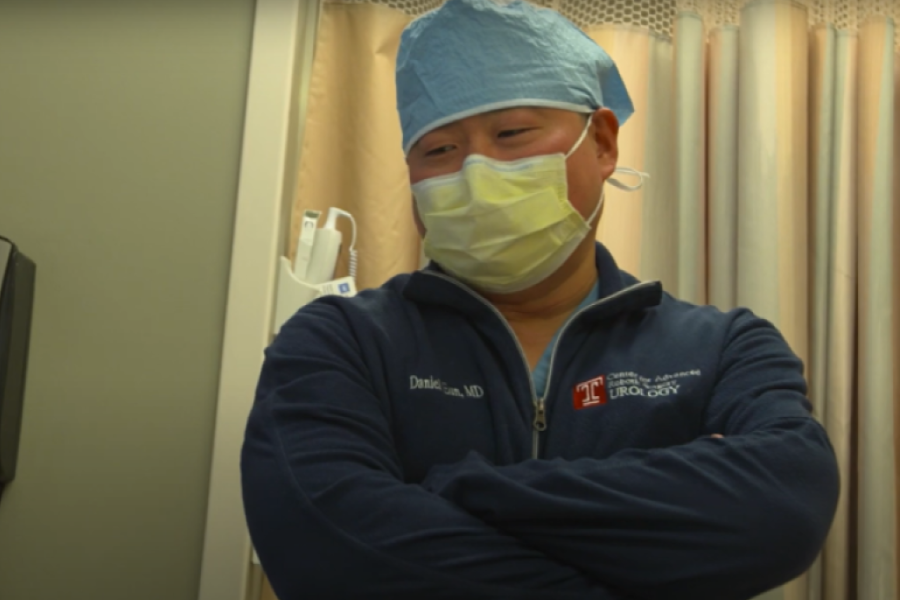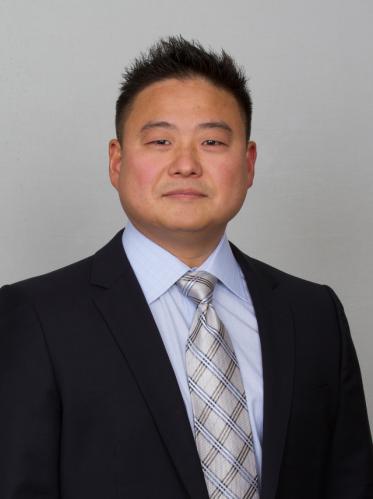Clinical Interests
- Minimally invasive removal of advanced tumors/cancers of the prostate:
- High risk prostate cancer, prior radiation therapy or brachytherapy (salvage prostatectomy), prior cryotherapy, prior prostate surgery, extremely enlarged gland size, prior kidney transplant
- Minimally invasive removal of bladder cancer:
- Robotic cystoprostatectomy, cystectomy or anterior exenteration with extended template pelvic lymph node dissection
- Completely intracorporeal (no open incision) creation of urinary diversion
- High risk bladder cancer, prior radiation therapy or brachytherapy (salvage cystectomy)
- Bladder sparing partial cystectomy (select cases)
- Minimally invasive removal of kidney tumor/cancer
- Robotic radical nephrectomy (complete removal of kidney)
- Robotic kidney sparing techniques for complex tumors
- Patients who have multiple or bilateral kidney tumors
- Patients who have had prior kidney surgery or prior kidney tumor removal
- Patient with horseshoe kidney, kidney malrotation, renal ectopia, kidney duplication, cross-fused kidney, pelvic kidney or solitary (single) kidney
- Minimally invasive removal of ureteral cancer
- Robotic removal of the ureter and kidney collecting system or kidney sparing, partial/segmental removal of the ureter (select cases)
- Minimally invasive removal of adrenal tumor/cancer
- Robotic total adrenalectomy or partial adrenalectomy (select cases)
- Robotic removal of non-cancerous (benign), enlarged prostate (simple prostatectomy)
- Typically for prostate glands larger than 100 grams
- Patients with failed prior prostate surgery
- Patients with urinary retention (requiring a catheter)
- Patients with bladder diverticulum and or bladder stones
- Complex minimally invasive robotic reconstruction of the kidney, ureter and bladder
- Patients born with or who develop blockages of their ureter or kidney drainage
- Patients who have had trauma, radiation or surgical injury to their ureter or kidney drainage
- Patients who have a failed pyeloplasty, endopyelotomy, ureteral repair or balloon dilation
- Patient who have developed a fistula (abnormal connection or drainage) or leakage of urine due to prior surgery, trauma or radiation
- Complex repair of ureters using buccal mucosa (cheek lining) graft, appendix or bowel
- Patients unwilling to receive blood transfusions or Jehovah’s Witness patients
Research Interests
- Outcomes measurement, robotic guideline development, device and instrument design
- Development of novel techniques for complicated and challenging patient conditions
Highlights
Dr. Daniel Eun runs a regional high-volume referral practice for robotic treatment of genitourinary oncology as well as complex reconstructive surgery of the kidney, ureter, prostate and bladder. He has performed thousands of robotic procedures and more than 50 different types of robotic procedures. Dr. Eun has an extensive referral network from the tri-state area and commonly sees referrals from the northeast and mid-Atlantic regions. He commonly sees surgical consultations for complex patients with limited or no surgical options, such as morbidly obese, Jehovah’s Witness, prior surgery/radiation, prior trauma or surgical injuries.
Dr. Eun is internationally regarded as a thought leader in advanced robotic surgery techniques, robotic procedure development and training. He was trained at the first robotic training program in the world and helped develop some of the earliest techniques even before a surgical robot existed in Philadelphia. Since then, he has remained actively engaged with the device industry in meeting the needs of surgeons and guiding them to develop surgical technology for the future. He has developed numerous novel techniques and procedure modifications which have significantly advanced his field. He has extensively published peer-reviewed journal articles, book chapters and video teaching guides. He frequently travels nationally and internationally as an invited lecturer, present research, train surgeons and has performed over 50 live demonstration surgeries at meetings and training courses around the world. As director of Temple’s Robotic Urologic Surgery Fellowship Training Program and Chief of Robotic Surgical Services, Dr. Eun is an active member of the teaching faculty of the Lewis Katz School of Medicine, working closely with medical students, residents and fellows.
Education
- MD, Lewis Katz School of Medicine at Temple University, Philadelphia, PA
- BS, Biology, Pennsylvania State University, University Park, PA
Training
- Fellowship, Minimally Invasive Urologic Robotic Oncology, Henry Ford Hospital, Vattikuti Urology Institute, Detroit, MI
- Residency, Urology, Henry Ford Hospital, Vattikuti Urology Institute, Detroit, MI
- Internship, Surgery, Pennsylvania Hospital/University of Pennsylvania, Philadelphia, PA
Board Certifications
- American Board of Urology
Memberships
- American Urological Society
- Endourological Society
- Genitourinary Reconstructive Society
- Mid-Atlantic Section, American Urological Association
- Philadelphia Urologic Society
Awards and Honors
- Appreciation Award, Institute of Nephrology and Urology, Kuala Lumpur, Malaysia
- Appreciation Award, Korean Prostate Society
- Appreciation Award, Taiwanese urologic Association
- Appreciation Award, Krishna Institute of Medical Sciences, India
- Top 40 Docs Under 40, Philadelphia magazine, 2009
- Bloodless Medicine Physician Champion Award, Pennsylvania Hospital
- Top 40 Professionals Under 40”, Philadelphia Business Journal 2010
- Top Doc, Castle Connolly
- Top Doc, US News and World report
- Awarded 3 “Best Paper” Awards at 32nd World Congress of Endourology, Taiwan, 2014
- Awarded Honorary Professor of Urology by Nanchang University, Nanchang, China
- Awarded Best Laparoscopy/Robotics Paper “Multi-Institutional Study of Robotic Assisted Buccal Mucosa Graft Ureteroplasty: Initial Results” at 33rd Annual World Congress of Endourology, London, England 2015
- Awarded 1st Prize for Best Video Abstract “Near Infrared Imaging And Indocyanine Green for Complex Robot-Assisted Laparoscopic Reconstruction Involving Bowel Based Urinary Diversions” at the annual Societe Internationale D’Urologie (SIU) Meeting, Melbourne, Australia, 2015
- Awarded 1st Prize for Best Video in Renal Oncology Video “Technical Considerations for a Horseshoe Kidney and A Posteriorly Occurring Renal Mass: The Use of Intravenous Indocyanine Green and 4th Arm in Robotic-Assisted Partial Nephrectomy.” Video abstract at 112th Annual American Urologic Association Meeting, Boston, Massachusetts, 2017
- Awarded 1st Prize for Best Poster in Renal Oncology. “Development and Validation of an Objective Scoring Tool for Minimally Invasive Partial Nephrectomy: Scoring for Partial Nephrectomy(SPaN)”, 35th Annual World Congress of Endourology, Vancouver, Canada, 2017
- Top Doctors, Urology, Philadelphia magazine, 2017-2024



Patient Comments